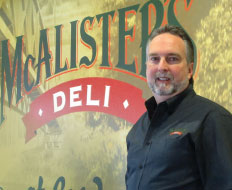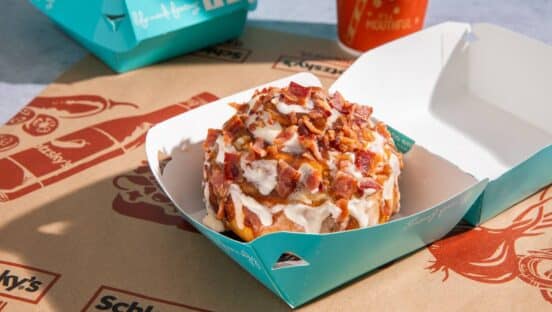David Blackburn has been in the foodservice business his entire adult life. Since 1979, the McAlister’s Deli franchisee has cataloged more than 25 years of experience in the casual-dining sector, spending 16 of those as regional vice president of operations at O’Charley’s.
Blackburn now owns and operates 23 McAlister’s Deli units across Tennessee, Mississippi, and Missouri.
He attributes his success in the quick-service sector largely to his casual-dining experience and expertise, from which he brings a focus on high levels of customer service and particular attention to staff training.
Blackburn discusses how franchisees can leverage these tactics to build quick-service success.
1. Find opportunities to engage
When I worked in the casual-dining sector, there was a focus on creating more opportunities to truly engage with the customer. This translates into the very thing that sets McAlister’s Deli apart, and that is our table service.
For a fast-casual concept, there is usually only one opportunity to engage with the customer: at the register. You’ll try to get as much dialogue in that situation as you can, but this is a short-timed affair.
At McAlister’s, we strive to engage with the customer three additional times: when bringing the food to the table; when refilling drinks and pre-bussing the table; and when proposing the idea of dessert.
These actions might be associated more strongly with casual dining, but it’s the engagement and service we are seeking to improve.
These additional engagement opportunities aren’t just for selling product; they are for servicing, too. By offering guests a refill, we have the chance to show the customers the appreciation we have for the business, and that’s really the core strength of the brand. Furthermore, we spend a lot of time training our staff on how to make the most of these instances with regards to service language—what things you want to say, or don’t want to say, to a guest at each particular moment.
Even with all those instances combined, it’s still a very short time span you actually get to interact with the customer, and we want to make the most of that.
2. Train your staff relentlessly
There are very few stones left unturned when it comes to staff training, even at the casual-dining level, and quick service is no different.
McAlister’s Deli has a very solid training program for employees and has specific training for each and every position, whether front or back of the house. The difference comes down to the commitment you have for the training and then, primarily, a relentless pursuit.
These are the individuals who run the engine on a daily basis. You need to ensure that it’s a good fit for your needs as a brand and that their specific needs are also met.
For instance, the training program we have for some of our younger managers has a big focus on courage—having enough courage to say to another employee, “That bread isn’t toasted enough,” or, “Only an hour more to go; let’s keep the good attitude going.” That can be really difficult for some people, but it’s a key factor in the daily success of the units.
The difference, again, comes down to a commitment to both your staff and your stores. You need to work on the character of the staff members, especially those who are managing other employees to the right and to the left.
It is always, and will always remain, a work in progress for your business. However, this type of commitment can take you from good to great.
3. Take advantage of your resources
A big challenge for me was leaving an environment that had a department for everything. When I left O’Charley’s, I had about 72 stores and what seemed like an infinite amount of resources available for every possible situation or scenario. From marketing and training to culinary, I had lots of people to help me troubleshoot.
When you’re a smaller franchisee, the lack of departments might seem alarming, but don’t cower in fear. The manpower might not be there, but the knowledge is, and there still are people to help.
I rely heavily on my multiunit supervisors at McAlister’s. These individuals are the experts in everything deli-related and can help me with anything I need in any department of the business. As a business owner, this is a relief. Only having to deal with one department, rather than several, is a time-saver.
4. Focus on relationships
As I mentioned, it’s no secret that in quick service, you have a very brief moment with the customer. Even with our additional engagement services, the 10 or 15 seconds that each instance provides might come out to a whole minute of interaction with the customer, and that could be on a good day.
Your staff must strive to make the most of the small window of one-on-one time they have with the guest. If one of your locations has regulars or a more talkative customer, try and keep the conversation going. Let other customers see it. This displays that atmosphere you’re striving to obtain.
McAlister’s Deli is a pretty savvy brand in and of itself. I studied it for about two years prior to getting the deal done, and it had everything I needed to make a successful transfer from one area to the other.
However, I brought in another casual-dining idea, the “alley rally,” which is a lineup that includes all the staff and any additional employees, such as managers. Here, we can talk about features, specials, and competitive challenges that you might have going to stimulate staff behaviors. It would also include focuses and goals for the day, week, or month.
I didn’t create or invent it, but it worked well in the casual sector and it can work for quick service, too. All of your staff benefits from these small meetings; more often than not, teaching the difference is the difference itself.












